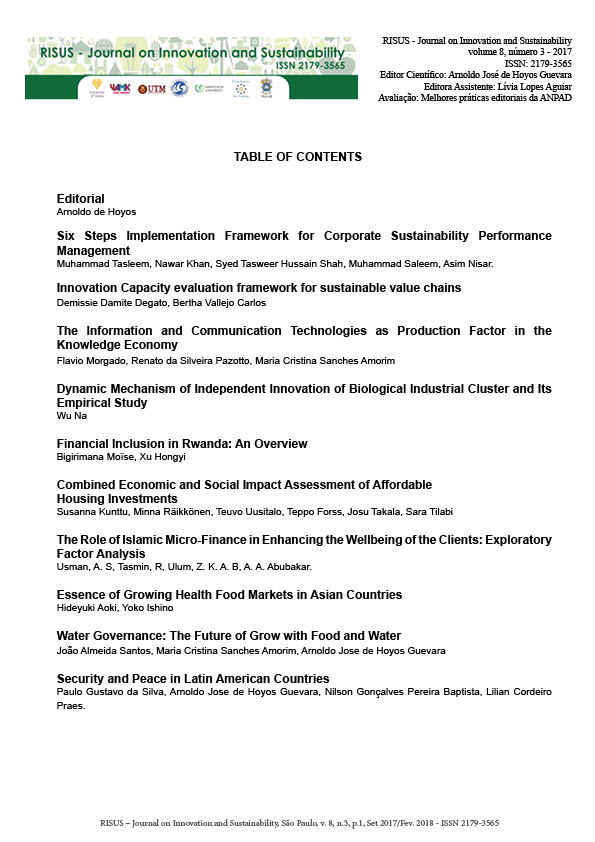Editorial
Resumen
On this issue we start with a paper from Pakistan regarding a proposal for a so much needed everywhere an efficient framework for Corporate Sustainability Performance Management. Then comes a paper with a proposal developed at The Tilburg University in the Netherlands for improving Innovation Capacity in Sustainable Value Chains by looking at the Case of four Value Chains from Ethiopia ( two local and two global ) and applying a fuzzy comprehensive evaluation model for measuring value chain innovation capacity, that shows that the simultaneous presence of technological upgrading, value chain restructuring and green governance reforms are sufficient conditions for the development of innovation capacity; and moreover that public-private partnership (innovation platform) is a necessary condition for achieving outstanding value chain innovation capacity. Then comes a paper from Brazil that deals, as recommended by UNCTAD, with ways of using Information and Communication Technologies ICTs to help on the development of Knowledge Economy in Brazil using Robert Solow modified production function that includes Technological Evolution, nowadays going on exponentially. Next comes a paper dealing with the dynamics of the process of Independent Innovations going on at the Biological Industrial Cluster biolake in Wuhan. Then we have a paper from Finland presenting a framework that combines economic and social impact aspects assessments and supports decision making related to affordable housing. Somehow expanding the same social spirit next comes a paper from Malaysia that explore, using factor analysis, the structural characteristics of Islamic Microfinance and statistically group them into Products (Independent), Empowerment (Mediator) and Clients’ wellbeing (dependent) constructs based on a case study of the Amanah Ikhtiar Malaysia microfinance organization. Following comes a study regarding Financial Inclusion in Rwanda, which no doubt is a growing major policy concern of governments all over the world due in particular to the accelerated increase of wealth concentration. The study shows a decrease on the financially excluded at the country, but without a necessary increase on the nationally included; although there is now a hope that mobile banking may help. Then comes an interesting paper from Japan that shows, using a Regression Analysis, that the Growing Health Food Markets in Asian Countries mostly depends on per-capita GDP and population aging rate increase, which no doubt over there is particularly relevant. Next two papers come from Brazil one is concerning the urgent need in the country for proper management and governance of basic and very interconnected basic resources like water and food to avoid waste and preserve the environment, that is everyday more critical due to Climate change; and the other one is about the need to consider the critical conditions concerning security and peace in Latin America to find out ways to overcome the socio-political-economic crises that we are living today due organized crime and lack of Governance.Descargas
Publicado
2017-09-01
Número
Sección
Editorial
Licencia
This Journal is licensed under a Creative Commons Attribution-Non Commercial-No Derivers 4.0 International license.
1.The author (s) authorize the publication of the article in the journal;
2.The author (s) warrant that the contribution is original and unpublished and is not in the process of being evaluated in other journal (s);
3. The journal is not responsible for the opinions, ideas and concepts emitted in the texts, as they are the sole responsibility of its author (s);
4. The editors are entitled to make textual adjustments and to adapt the articles to the standards of publication.


